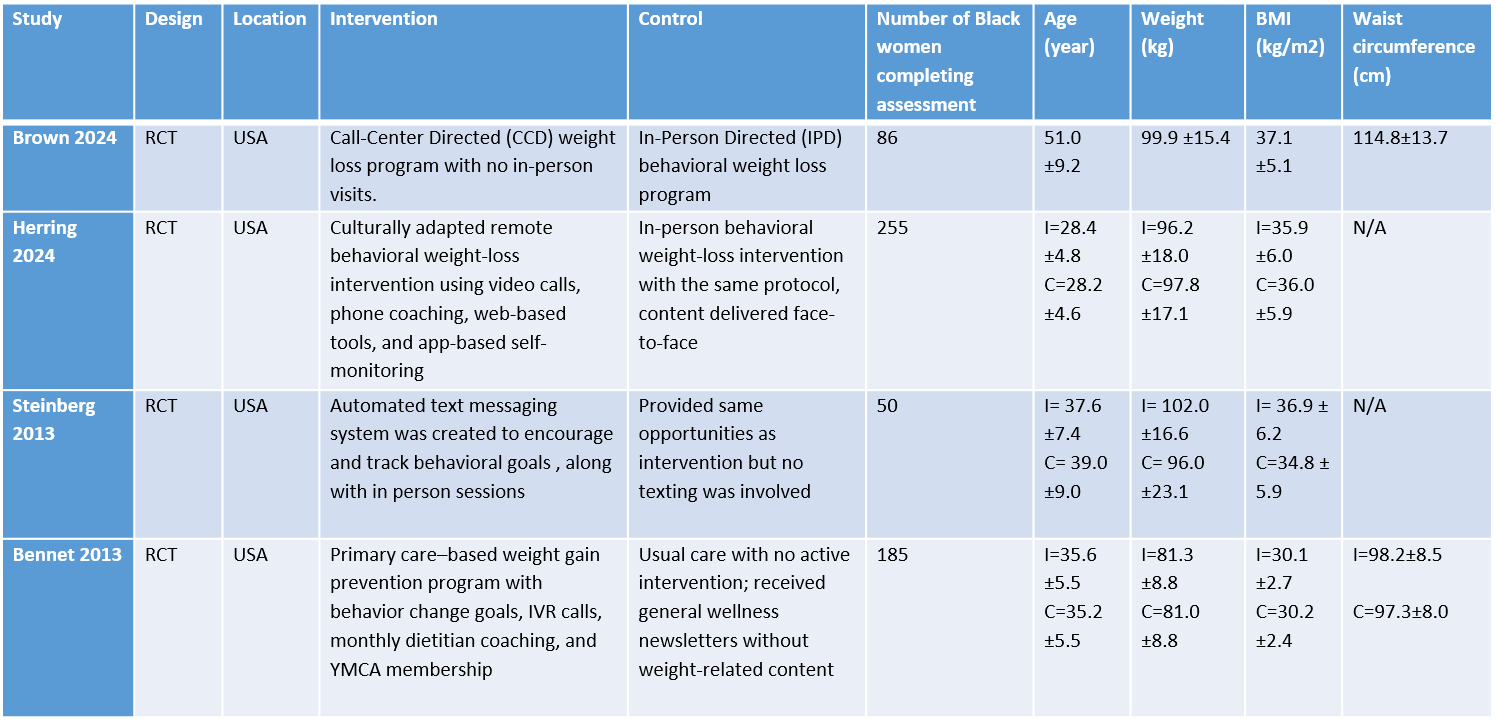Monday Poster Session
Category: Diet, Nutrition, and Obesity
P2701 - Advancing Health Equity Through Telehealth: A Systematic Review and Meta-Analysis of Remote vs In-Person Weight-Loss Interventions Among Black Women With Obesity
Monday, October 27, 2025
10:30 AM - 4:00 PM PDT
Location: Exhibit Hall

Umar Farooque, MBBS (he/him/his)
Health Education England, East of England, United Kingdom
Luton, England, United Kingdom
Presenting Author(s)
Umar Farooque, MBBS1, Meer Murtaza, MBBS2, Muhammad Umer, MBBS3, Ayesha Johar, MPH4, Fnu Aparna, MBBS5, Aqsa Riaz Khan, MBBS6, Anish Kumar, MBBS7, Nazeer Ahmed, 8, Syeda Hafsa Qadri, MBBS, MD9, Hiba Idrees, MBBS10, Aman Ullah, MBBS11, Aasma Shaukat, MD, MPH, FACG12
1Health Education England, East of England, United Kingdom, Luton, England, United Kingdom; 2Liaquat University of Medical and Health Science, Shahpur Chakar, Sindh, Pakistan; 3King Edward Medical University, Bellmawr, NJ; 4Khyber Medical College, Clermont, FL; 5Shaheed mohtarma benazir bhutto university, Karachi, Sindh, Pakistan; 6Foundation University Medical College, Islamabad, Islamabad, Pakistan; 7Liaquat University of Medical and Health Science, Hyderabad, Sindh, Pakistan; 8Karachi Medical and Dental College karachi, Karachi, Sindh, Pakistan; 9Dow University of Health Sciences, Karachi, Sindh, Pakistan; 10Karachi Medical and Dental College, Karachi, Sindh, Pakistan; 11Quaid e Azam Medcal college, Queens, NY; 12NYU Grossman School of Medicine, Division of Gastroenterology and Hepatology, New York, NY
Introduction: Obesity is a major U.S. public health issue, disproportionately affecting non-Hispanic Black women. This population faces elevated risks of obesity-related gastrointestinal (GI) diseases, such as non-alcoholic fatty liver disease (NAFLD), gastroesophageal reflux disease (GERD), and colorectal cancer. Structural barriers, including poverty, limited healthcare access, and lower educational attainment, impede effective weight management. The expansion of telehealth presents an opportunity to enhance health equity. However, the comparative effectiveness of remote versus in-person weight-loss interventions in this high-risk group remains uncertain. This systematic review and meta-analysis assess the effectiveness of remote versus in-person interventions for Black women with obesity, aiming to support equitable, GI-focused obesity care.
Methods: We conducted a systematic review and meta-analysis per PRISMA guidelines, searching PubMed, Embase, and Cochrane through April 2025. Eligible studies were randomized controlled trials (RCTs) comparing remote ± in-person vs. in-person weight-loss interventions among Black or African American women with a body mass index (BMI) ≥ 30 kg/m². Random-effects meta-analyses estimated pooled changes in weight, percentage weight loss, BMI, blood pressure, and lipid levels (total cholesterol, LDL, HDL, triglycerides).
Results: Four RCTs (N = 576) were included (Table 1). The analysis found no statistically significant differences in primary outcomes of weight change (SMD - 0.22, 95% CI: - 0.68; 0.24) (Figure 1), percentage weight loss (SMD - 0.80, 95% CI: - 3.86; 2.26), and BMI (SMD - 0.26, 95% CI: - 1.61; 1.11). Secondary outcomes, such as blood pressure and lipid profiles (HDL, LDL, total cholesterol, triglycerides), also showed no statistically significant difference across intervention formats.
Discussion: Remote weight-loss interventions are comparably effective to traditional in-person programs in reducing weight and improving metabolic outcomes among Black women with obesity. These findings underscore the potential of telehealth-based approaches to expand access to obesity care in underserved populations. For gastroenterologists managing obesity-related GI and metabolic disorders, digital interventions offer a scalable and equitable solution to close racial and structural gaps in preventive health services.
ChatGPT (OpenAI) was used for language clarity and grammar refinement. All scientific content, data, and analysis are original and solely by the authors.

Figure: Table 1. Baseline characteristics of included studies.
N/A: not available; RCT: randomized controlled trials; BMI: body mass index

Figure: Figure 1. Forest plot comparing weight change between remote ± in-person and in-person weight-loss interventions among Black women with obesity.
Disclosures:
Umar Farooque indicated no relevant financial relationships.
Meer Murtaza indicated no relevant financial relationships.
Muhammad Umer indicated no relevant financial relationships.
Ayesha Johar indicated no relevant financial relationships.
Fnu Aparna indicated no relevant financial relationships.
Aqsa Riaz Khan indicated no relevant financial relationships.
Anish Kumar indicated no relevant financial relationships.
Nazeer Ahmed indicated no relevant financial relationships.
Syeda Hafsa Qadri indicated no relevant financial relationships.
Hiba Idrees indicated no relevant financial relationships.
Aman Ullah indicated no relevant financial relationships.
Aasma Shaukat: Freenome inc – Consultant.
Umar Farooque, MBBS1, Meer Murtaza, MBBS2, Muhammad Umer, MBBS3, Ayesha Johar, MPH4, Fnu Aparna, MBBS5, Aqsa Riaz Khan, MBBS6, Anish Kumar, MBBS7, Nazeer Ahmed, 8, Syeda Hafsa Qadri, MBBS, MD9, Hiba Idrees, MBBS10, Aman Ullah, MBBS11, Aasma Shaukat, MD, MPH, FACG12. P2701 - Advancing Health Equity Through Telehealth: A Systematic Review and Meta-Analysis of Remote vs In-Person Weight-Loss Interventions Among Black Women With Obesity, ACG 2025 Annual Scientific Meeting Abstracts. Phoenix, AZ: American College of Gastroenterology.
1Health Education England, East of England, United Kingdom, Luton, England, United Kingdom; 2Liaquat University of Medical and Health Science, Shahpur Chakar, Sindh, Pakistan; 3King Edward Medical University, Bellmawr, NJ; 4Khyber Medical College, Clermont, FL; 5Shaheed mohtarma benazir bhutto university, Karachi, Sindh, Pakistan; 6Foundation University Medical College, Islamabad, Islamabad, Pakistan; 7Liaquat University of Medical and Health Science, Hyderabad, Sindh, Pakistan; 8Karachi Medical and Dental College karachi, Karachi, Sindh, Pakistan; 9Dow University of Health Sciences, Karachi, Sindh, Pakistan; 10Karachi Medical and Dental College, Karachi, Sindh, Pakistan; 11Quaid e Azam Medcal college, Queens, NY; 12NYU Grossman School of Medicine, Division of Gastroenterology and Hepatology, New York, NY
Introduction: Obesity is a major U.S. public health issue, disproportionately affecting non-Hispanic Black women. This population faces elevated risks of obesity-related gastrointestinal (GI) diseases, such as non-alcoholic fatty liver disease (NAFLD), gastroesophageal reflux disease (GERD), and colorectal cancer. Structural barriers, including poverty, limited healthcare access, and lower educational attainment, impede effective weight management. The expansion of telehealth presents an opportunity to enhance health equity. However, the comparative effectiveness of remote versus in-person weight-loss interventions in this high-risk group remains uncertain. This systematic review and meta-analysis assess the effectiveness of remote versus in-person interventions for Black women with obesity, aiming to support equitable, GI-focused obesity care.
Methods: We conducted a systematic review and meta-analysis per PRISMA guidelines, searching PubMed, Embase, and Cochrane through April 2025. Eligible studies were randomized controlled trials (RCTs) comparing remote ± in-person vs. in-person weight-loss interventions among Black or African American women with a body mass index (BMI) ≥ 30 kg/m². Random-effects meta-analyses estimated pooled changes in weight, percentage weight loss, BMI, blood pressure, and lipid levels (total cholesterol, LDL, HDL, triglycerides).
Results: Four RCTs (N = 576) were included (Table 1). The analysis found no statistically significant differences in primary outcomes of weight change (SMD - 0.22, 95% CI: - 0.68; 0.24) (Figure 1), percentage weight loss (SMD - 0.80, 95% CI: - 3.86; 2.26), and BMI (SMD - 0.26, 95% CI: - 1.61; 1.11). Secondary outcomes, such as blood pressure and lipid profiles (HDL, LDL, total cholesterol, triglycerides), also showed no statistically significant difference across intervention formats.
Discussion: Remote weight-loss interventions are comparably effective to traditional in-person programs in reducing weight and improving metabolic outcomes among Black women with obesity. These findings underscore the potential of telehealth-based approaches to expand access to obesity care in underserved populations. For gastroenterologists managing obesity-related GI and metabolic disorders, digital interventions offer a scalable and equitable solution to close racial and structural gaps in preventive health services.
ChatGPT (OpenAI) was used for language clarity and grammar refinement. All scientific content, data, and analysis are original and solely by the authors.

Figure: Table 1. Baseline characteristics of included studies.
N/A: not available; RCT: randomized controlled trials; BMI: body mass index

Figure: Figure 1. Forest plot comparing weight change between remote ± in-person and in-person weight-loss interventions among Black women with obesity.
Disclosures:
Umar Farooque indicated no relevant financial relationships.
Meer Murtaza indicated no relevant financial relationships.
Muhammad Umer indicated no relevant financial relationships.
Ayesha Johar indicated no relevant financial relationships.
Fnu Aparna indicated no relevant financial relationships.
Aqsa Riaz Khan indicated no relevant financial relationships.
Anish Kumar indicated no relevant financial relationships.
Nazeer Ahmed indicated no relevant financial relationships.
Syeda Hafsa Qadri indicated no relevant financial relationships.
Hiba Idrees indicated no relevant financial relationships.
Aman Ullah indicated no relevant financial relationships.
Aasma Shaukat: Freenome inc – Consultant.
Umar Farooque, MBBS1, Meer Murtaza, MBBS2, Muhammad Umer, MBBS3, Ayesha Johar, MPH4, Fnu Aparna, MBBS5, Aqsa Riaz Khan, MBBS6, Anish Kumar, MBBS7, Nazeer Ahmed, 8, Syeda Hafsa Qadri, MBBS, MD9, Hiba Idrees, MBBS10, Aman Ullah, MBBS11, Aasma Shaukat, MD, MPH, FACG12. P2701 - Advancing Health Equity Through Telehealth: A Systematic Review and Meta-Analysis of Remote vs In-Person Weight-Loss Interventions Among Black Women With Obesity, ACG 2025 Annual Scientific Meeting Abstracts. Phoenix, AZ: American College of Gastroenterology.
